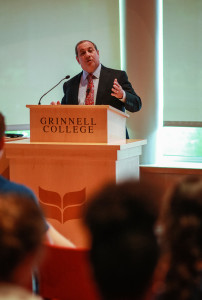By Emily Jordan, jordanem@grinnell.edu
Last Wednesday, Sept. 2, visiting professor George Lopez delivered a lecture entitled, “Attaining Hard Peace, Soft Peace and Smart Peace.”
Lopez was a founding member of the Kroc Institute for International Peace Studies at the University of Notre Dame, as well as the former Vice President of the Academy for International Conflict Management and Peacebuilding at the United States Institute of Peace. This semester, Lopez will teach a course at Grinnell entitled “Intro to Peace and Conflict Studies” alongside Professor Timothy Dobe, Religious Studies.
During his opening lecture, Lopez spoke about the distinctions between “soft” and “hard” peace, and how together they form what he calls “smart” peace. Lopez suggested that “smart peace” might enable nations to not only react to violent incidents, but also to pre-emptively analyze situations and take preventative steps to curtail the possibility of violence.
“[Hard peace is] the set of conditions where we have protracted, organized, brutal violence which has resulted in over 1,000 deaths per year for multiple years,” Lopez said.
In addition, Lopez argued, “hard” peace often involves multiple local actors who possess outside sponsors. This sets up a condition in which it is very difficult t
o gather the warring parties in order to resolve grievances. On the other hand, Lopez describes “soft” peace as peace in which the local parties realize that outside involvement is necessary for a peace deal. In the blending of “soft” and “hard” peace, “smart” peace strives to prevent recidivism after peace agreements.
Lopez argues that perhaps the most important aspect of the peace-building process is empathy and attempting to understand the motives that propel people into becoming violent actors. During his talk, he responded to a question posed by an audience member about the threat of ISIS.
“This is a problem that has its roots not only in the Saddam Hussein era, but the wider Middle East struggle between Shia and Sunni,” Lopez said.
Lopez said he hopes that his class will promote greater student awareness of the Peace and Conflict Studies field. He also addressed “the notion of these really perplexing issues about how natural is violence and war versus how much we can invent ways to control it.”
At the end of the course, he hopes that students will be able to come up with their own, unique thoughts about this concept.
Ultimately, Lopez said he hopes that his legacy at Grinnell will be to empower students to take aspects of peace building into their own hands and to realize everyone has a role to play in creating a peaceful and prosperous world.
“[I hope my students develop] a sense that the ‘hard’ peace part and some of the ‘soft’ peace part traditionally have been the work of diplomats, prime ministers and generals,” Lopez said. “The future of violence-control and peace building is going to involve a lot of other professions and ways of life … lots of people in the audience have the potential to be peacebuilders. You don’t just have to grow up to be Secretary of State,” Lopez said.





















































